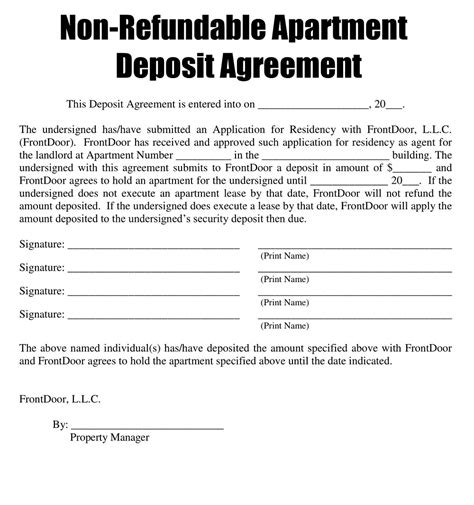How To Get Non Refundable Deposit Back
Ronan Farrow
Mar 24, 2025 · 3 min read

Table of Contents
How to Get a Non-Refundable Deposit Back: A Comprehensive Guide
Getting a non-refundable deposit back feels like a lost cause, but it's not always impossible. While the term "non-refundable" sounds definitive, several situations could allow you to recoup some or all of your money. This guide will explore various strategies and scenarios to help you navigate this tricky situation.
Understanding "Non-Refundable"
Before diving into recovery strategies, it's crucial to understand what "non-refundable" truly means. Generally, it signifies that the deposit is forfeited if the agreement's terms aren't met. This is often seen in contracts for services like travel bookings, event tickets, or rental agreements. However, the enforceability of "non-refundable" clauses depends significantly on the specifics of the contract and applicable laws.
Situations Where You Might Recoup Your Deposit
While a non-refundable deposit sounds final, several exceptions exist. Let's explore scenarios where you might have a chance of getting your money back:
1. Breach of Contract by the Service Provider
If the service provider breaches the contract – for instance, canceling a service you booked, significantly altering the agreed terms, or failing to provide the service as promised – you might be entitled to a refund, even if the deposit was labeled "non-refundable." Document everything: keep copies of your contract, emails, and any other communication. This evidence will be crucial in your case.
2. Misrepresentation or Fraud
If the service provider misled you about the service or made fraudulent claims during the booking process, you might have grounds to challenge the "non-refundable" clause. This requires solid evidence of misrepresentation. Gather all documentation, including advertisements, emails, and any other information that proves misleading statements.
3. Force Majeure Events
Events beyond anyone's control, like natural disasters or pandemics, often allow for exceptions to contractual obligations. If a force majeure event prevented the service from being delivered, you have a stronger argument for a refund. Check your contract: Many contracts specifically address force majeure situations.
4. Unforeseen Circumstances (Specific Cases)
In some cases, unforeseen and significant personal circumstances (like a serious illness or a family emergency) might allow you to negotiate a partial or full refund, even if the deposit is technically non-refundable. This is a case-by-case scenario, and success relies heavily on demonstrating the legitimacy of your situation. Prepare a detailed explanation: Explain your situation clearly and professionally, providing any supporting documentation.
Strategies for Getting Your Money Back
Once you've identified a potential reason for a refund, here are effective strategies:
1. Contact the Service Provider Directly
Start by contacting the service provider politely but firmly, outlining the reasons why you believe you deserve a refund. Be prepared to cite specific clauses in the contract or relevant laws. A well-written email detailing your concerns is often a good first step.
2. Escalate Your Complaint
If your initial communication yields no results, escalate your complaint. Many businesses have a formal complaints procedure. Follow it diligently, keeping records of each step.
3. Explore Legal Options
If all other avenues fail, consider seeking legal advice. A lawyer can assess your situation, determine the legal merits of your case, and advise you on the best course of action.
Prevention is Key: Future Bookings
To avoid future frustrations with non-refundable deposits, consider the following:
- Read the Fine Print: Always carefully review the terms and conditions before making a payment.
- Consider Travel Insurance: Travel insurance often covers unforeseen circumstances that could lead to trip cancellations.
- Use a Credit Card: Credit card disputes can offer some protection against fraudulent or misleading transactions.
Getting a non-refundable deposit back can be challenging, but it's not impossible. By understanding your rights, gathering evidence, and employing the right strategies, you can significantly increase your chances of success. Remember, persistence and proper documentation are your strongest allies.
Featured Posts
Also read the following articles
| Article Title | Date |
|---|---|
| How To Get Fine Dirt Out Of Pool | Mar 24, 2025 |
| How To Dye With Turmeric | Mar 24, 2025 |
| How To Choose A Wedding Theme | Mar 24, 2025 |
| How To Clean Canvas On Tent Trailer | Mar 24, 2025 |
| How To Fill Out Construction Permit Application Nj | Mar 24, 2025 |
Latest Posts
-
How Can You Tell Van Winkles Trousers
Apr 03, 2025
-
How Can You Tell The Age Of A Refrigerator
Apr 03, 2025
-
How Can You Tell If Your Chimney Is On Fire
Apr 03, 2025
-
How Can You Tell If A Tooth Implant Is Failing
Apr 03, 2025
-
How Can We Unleash Your Superpowers For A Positive Change
Apr 03, 2025
Thank you for visiting our website which covers about How To Get Non Refundable Deposit Back . We hope the information provided has been useful to you. Feel free to contact us if you have any questions or need further assistance. See you next time and don't miss to bookmark.
